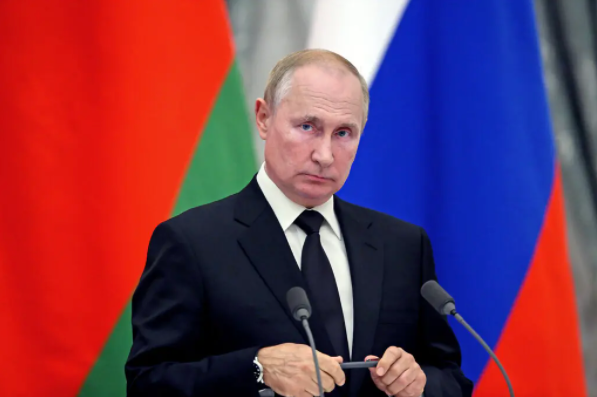
Why do we go to war? Sometimes national glory is the aim, and sometimes resources can spark it (or perhaps, I would argue, the CEO of a defense contractor just wants a new yacht). For Vladimir Putin, however, this war in Ukraine is about something different: legacy. Putin began his career as a KGB agent burning documents as the Berlin Wall fell, and someday, he shall end his career after decades as the most powerful man in Russia.
At least, this is the picture he wants us to see, and it explains why he stages photo shoots of him hunting or riding horses shirtless. To us in the West, the spectacle is funny and meme-worthy, something to ridicule on social media, but for Putin, it is an opportunity to project strength. Putin has been able to maintain power not only by having armies of hackers and securing the loyalty of oligarchs, but also by projecting the image of a strong leader who ‘gets things done,’ in contrast to the bickering democracies found in the West. He furthers this image through photo ops, often derided on the Internet, but additionally through the utilization of state-controlled media and the Russian national intelligence agency. Putin wields this agency against opposition figures such as Alexei Navalny, an anti-corruption candidate who was poisoned and later arrested by Putin’s regime for dissent.
Putin wants many things — a divided West, higher oil prices, a paper-thin opposition — all of which he has managed to achieve in one way or another. What he desires most, however, is a strong Russia in the mold of the former Soviet Union, with borders far from NATO’s reach. This is what he wants his legacy to be, and this is why he is now invading Ukraine. The specter of a reunified Soviet Empire has continued to loom over Eastern Europe in recent years, and former Eastern Bloc countries such as Poland and Romania have joined both the European Union and NATO in response, bringing the military alliance’s influence closer and closer to Moscow. This threatens the strongman image that Putin tries to project.
Supporters of strongmen like Putin want geopolitics to be like a prison yard — where the biggest guy who can talk the loudest wins — but if anything, this invasion has proved the opposite. These qualities are antithetical to what those of us in the West should look for in a leader. And yet, Putin has found many fans in the United States, especially amongst the American right. In 2017, a Gallup poll found that one out of three Republicans had a favorable view of the Russian president, up from 12% two years prior and triple the favorability of registered Democrats. This year, 62% of registered Republicans called Putin a stronger leader than Joe Biden in a Yahoo News poll.
Former President Donald Trump has praised Putin both while campaigning and during the ongoing Ukrainian conflict. He called the Russian a “strong leader” on the 2016 campaign trail and has called his recent actions “genius” as a jab at President Biden. He is not alone in this praise. In 2014, former Alaska Governor Sarah Palin called him someone “who wrestles bears and drills for oil” in a Fox News interview. These quotes illustrate the degree to which international markets are receptive to Putin’s propaganda, as well as domestic ones. He wants this strongman image to go beyond his own borders and to be used as ammunition by potential allies abroad. This is dangerous
.
None of the above statements are direct compliments, and their speakers never deny Mr. Putin’s tyrannical actions. Instead, they are arguing for our leaders to be more similar to the Russian autocrat. Vladimir Putin is strong and likes oil, the Democrats are weak and hate oil, ergo Democrats should be more like Putin. This is an unhealthy set of priorities to possess for leaders both domestic and abroad. We shouldn’t look to who can have the most alpha leader. This is no war between “woke” leaders and a traditionalist alpha male, it details a desperate, aging tyrant attacking an innocent nation so he can prop up a legacy. The America I know does not celebrate those qualities, and it never should.
Russia has been halted after a few early victories, not just by the guerrilla fighting of the Ukrainian people, but also by a unified West and EU, who have effectively locked Russia out of international trade via heavy sanctions. The ruble is at its lowest value in decades, and while oil prices have skyrocketed since the invasion, Russia cannot sell oil if it has no access to relevant oil markets.
Make no mistake, I too have been inspired by Ukrainian President Volodymyr Zelenskyy. He is doing what few world leaders would do in this case: standing with his people during an existential crisis. However, that does not mean that those currently fawning over Putin should transfer their affection to Zelenskyy, per se. Instead, we should look to leaders who understand the global landscape and can unite allies against common goals. We’re not going to ‘out-man’ Putin in this war, just like we’re not going to ‘out-man’ climate change or global poverty.
The lesson to be learned here is not that we should not look to our leaders for inspiration or as role models, but instead that we should recognize that the personas they project have symbolic power beyond their images at face-value. When we validate Putin’s despotic image, we validate all the corruption, propaganda and human rights violations that he performed to create that image, and we do a disservice to the leaders who do what leaders should do in times of crisis: lead.
















